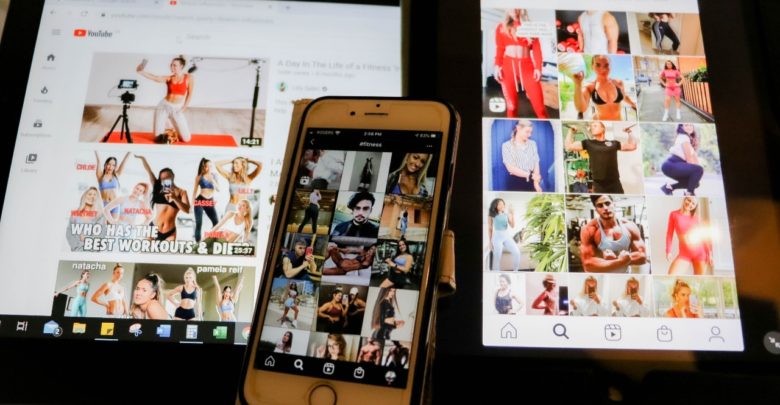Fitness influencer culture promotes unhealthy body image
Fitness influencer culture can be dangerous, both physically and for your body image
 Jillian Metcalfe
Jillian MetcalfeWith the increasing popularity of social media, the fitness industry is rapidly transforming.
Instagram has given birth to the “fitness influencer,” a person selling workout plans and promoting nutritional tips on social media. These influencers build personal brands and gain followings primarily based on how they, or rather their bodies, look. This culture, albeit popular, is undeniably dangerous.
Many fitness influencers and bloggers are not qualified to be giving fitness advice, according to a study conducted at the University of Alberta. Of the fitness professionals studied, only 16.4% had any certifications. The advice these influencers are providing, whether it be on diet plans or injury rehabilitation, has no basis in health and physical sciences. Simply put, much of the fitness information online is wrong.
Not only is the information provided by online fitness “professionals” incorrect, it can have serious impacts to its consumers. Incorrect exercise and nutritional advice can lead to malnourishment, injury, and a lack of results for the user. This can cause many to become discouraged in their fitness regimes, and have a poor perception of fitness overall. When an individual’s primary source of exercise information is Instagram, they can be misled to the benefits of living a healthy lifestyle.
The idea of an influencer’s healthy lifestyle can lead to serious misperceptions of body image. Most fitness influencers are extremely fit, and they promote their individualized exercise regimes by posting insanely toned photos of themselves. However, those idealized representations of the body are not true; many photos capture an influencer’s ideal angles, and are airbrushed to get rid of even the smallest imperfections. As fitness influencers are dominating the industry, their photos become representative of fitness and a “healthy” body. With this endless stream of fitness imagery, many individuals, especially the younger population, are developing an unnatural view of body image.
The ideal body for a fitness influencer is not representative of the various body types normal people have. Only a certain type of body is promoted, and thus individuals constantly compare themselves to it. The fitness influencer focuses on outward appearance, which can have an immense impact on a person’s mental health.
While the fitness influencer industry can provide an online community that promotes exercise and healthy lifestyles, it does not do this in practice. A lack of regulation in the fitness industry leads to “professionals” offering unreliable and incorrect advice. As fitness influencers continue to gain popularity, they have a responsibility to their followers to be as honest and accurate as possible.
There needs to be tangible changes in the fitness influencer industry to remedy these problems. Primarily, regulations need to be introduced to define who is legitimately a fitness “professional;” these regulations should limit the content and advice unqualified individuals can provide. As well, it is important to be using a variety of sources when creating an individualized fitness plan. At least one of these resources shouldn’t be an Instagram account.
However, fitness influencer culture threatens the positive sense of community that exercise can provide. Influencers’ content is usually extremely edited, and this can have many serious consequences to individuals beginning their fitness journey. I would recommend trying to stay away from most fitness influencers on Instagram. Instead, check out online resources such as the Nike Training Club app to start your fitness regime.
If you are interested in following some influencers, I recommend Hayley Madigan and Danyele Wilson; they post many workouts and fitness tips, but their content promotes body confidence and the positive benefits of exercise.
Fitness influencers, rather than focusing on posting about your illusive “perfect” body, please be wary of the messages you’re posting and the advice you’re giving. For many people, you are their sole source of fitness and exercise information.




